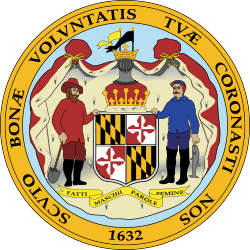| Elections in Maryland |
|---|
 |
Maryland held its elections October 3, 1814.
| District | Incumbent | This race | |||
|---|---|---|---|---|---|
| Representative | Party | First elected | Results | Candidates [a] | |
| Maryland 1 [1] | Philip Stuart | Federalist | 1810 | Incumbent re-elected. | √ Philip Stuart (Federalist) 99.8% |
| Maryland 2 [2] | Joseph Kent | Democratic-Republican | 1810 | Incumbent lost re-election. New member elected. Federalist gain. | √ John C. Herbert (Federalist) 57.3% Joseph Kent (Democratic-Republican) 42.6% |
| Maryland 3 [3] | Alexander C. Hanson | Federalist | 1812 | Incumbent re-elected. | √ Alexander C. Hanson (Federalist) 99.4% |
| Maryland 4 [4] | Samuel Ringgold | Democratic-Republican | 1810 | Incumbent lost re-election. New member elected. Federalist gain. | √ George Baer Jr. (Federalist) 51.4% Samuel Ringgold (Democratic-Republican) 48.5% |
| Maryland 5 Plural district with 2 seats [5] | Nicholas R. Moore | Democratic-Republican | 1803 1810 (Lost) 1812 | Incumbent re-elected. | √ Nicholas R. Moore (Democratic-Republican) 38.3% √ William Pinkney (Democratic-Republican) 38.0% John E. Howard (Federalist) 22.9% |
| Alexander McKim | Democratic-Republican | 1808 | Incumbent retired. New member elected. Democratic-Republican hold. | ||
| Maryland 6 [6] | Stevenson Archer | Democratic-Republican | 1811 (Special) | Incumbent re-elected. | √ Stevenson Archer (Democratic-Republican) 51.8% Abraham Jarrett (Federalist) 48.1% |
| Maryland 7 [7] | Robert Wright | Democratic-Republican | 1810 (Special) | Incumbent re-elected. | √ Robert Wright (Democratic-Republican) 52.5% Samuel W. Thomas (Federalist) 47.5% |
| Maryland 8 [8] | Charles Goldsborough | Federalist | 1804 | Incumbent re-elected. | √ Charles Goldsborough (Federalist) 96.2% Thomas E. Waggaman (Democratic-Republican) 3.8% |